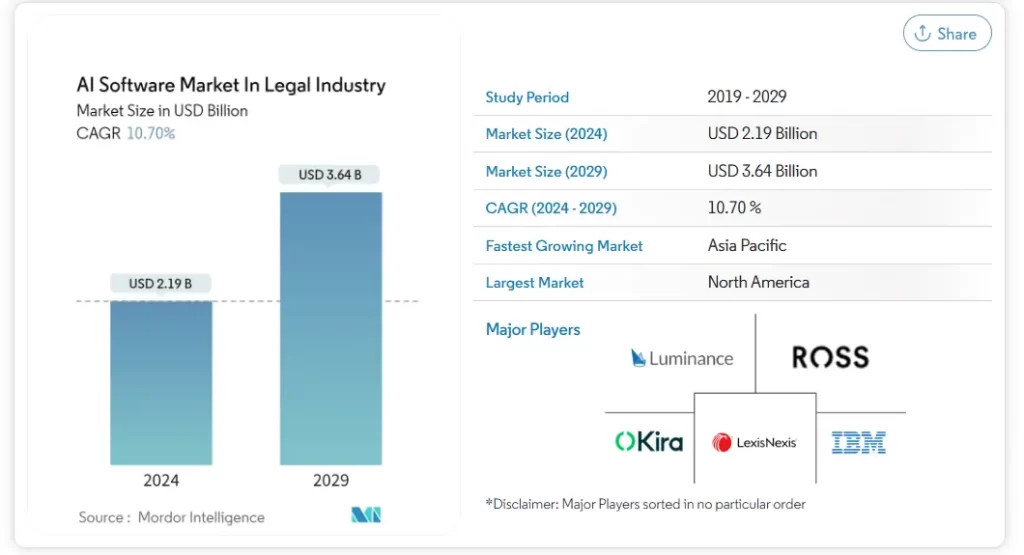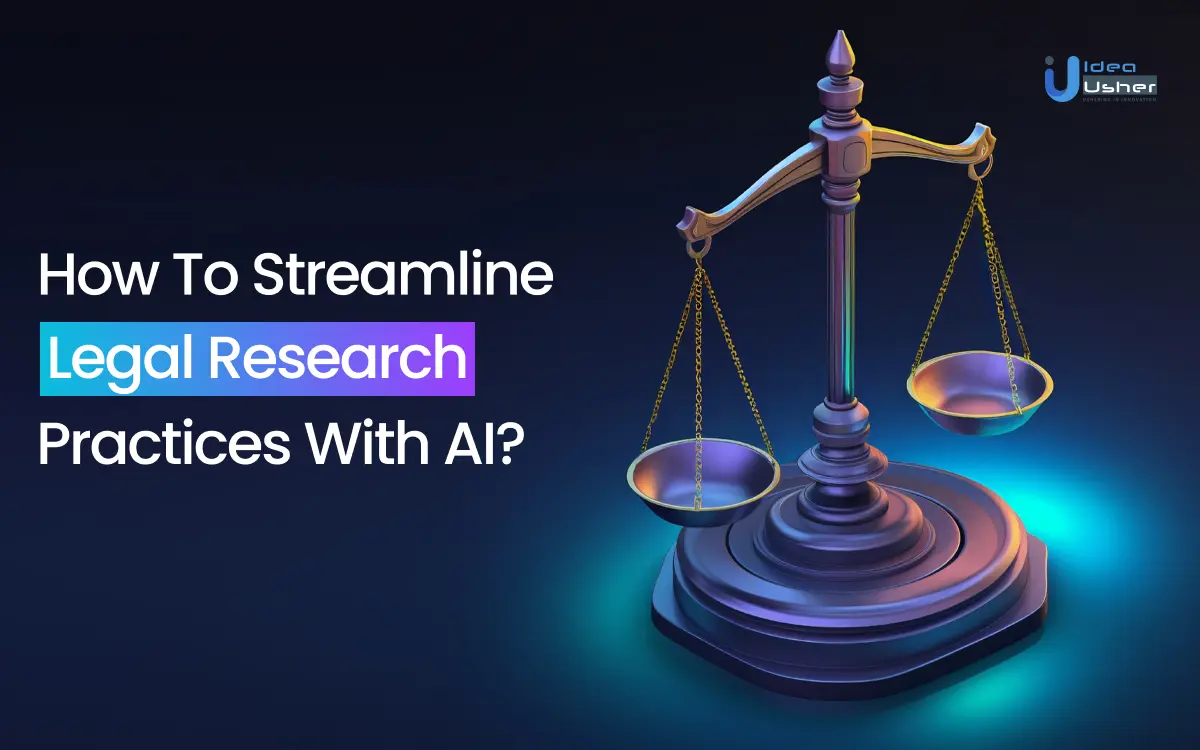Artificial intelligence (AI) is revolutionizing legal research. Traditionally a time-consuming process of sifting through vast amounts of legal data, AI-powered tools transform how this information is analyzed.
These tools enhance the precision of legal research by identifying relevant information and uncovering hidden patterns within legal data.
Legal professionals can leverage AI to focus on the complexities of their cases that require human judgment.
Explore the influence of artificial intelligence on legal research, noting both the potential advantages and the ethical and legal issues it raises.
Legal AI Software Market

Source: MordorIntelligence
A booming Legal AI software market signifies a wealth of opportunity for businesses. This growth suggests a rising demand for AI-powered solutions in the legal field. Companies that develop software for contract analysis, legal research assistance, or even automated due diligence tasks are well-positioned to capitalize on this trend.
By providing efficient and cost-effective legal tools, these businesses can cater to the needs of law firms, corporate legal departments, and potentially even individual clients in the future.
Standard Case Analysis and Legal Research Methods
Legal research, the cornerstone of legal decision-making, has traditionally relied on meticulous manual efforts. This tried-and-tested approach involves several key steps:
1. Defining the Legal Issue
The journey begins with identifying the core legal question. This critical first step acts as a compass, guiding the entire research process. By pinpointing the exact legal issue, lawyers can tailor their research to the most relevant legal sources and efficiently navigate the vast legal landscape.
2. Shepherdizing Cases
Once the legal issue is clear, lawyers delve into legal precedents—court decisions that set legal benchmarks. However, the legal landscape is constantly evolving. To ensure these precedents remain valid, lawyers engage in “shepherding.” This meticulous task involves tracing a case’s history to identify subsequent rulings that may have overturned or modified it. By shepherding cases, lawyers can confidently rely on sound legal foundations.
3. Leveraging Legal Encyclopedias
Compendiums of legal knowledge, legal encyclopedias, and treatises offer invaluable resources for legal researchers. These comprehensive works provide in-depth analysis of various legal topics, encompassing relevant statutes, case law, and legal principles. By consulting these authoritative sources, lawyers gain a solid foundational understanding of their specific issue’s legal landscape. This enriched perspective empowers them to delve deeper into their research with greater focus and efficiency.
Traditional vs. AI-Driven Legal Research
The legal profession is fueled by Artificial Intelligence (AI). This new wave of technology fundamentally changes legal research, offering substantial advantages over traditional methods. Here, we’ll delve into the key differences between AI-powered legal research and its well-established predecessor:
1. Speed and Efficiency
Traditionally, legal research can be time-consuming. Manually sifting through vast legal libraries and meticulously combing through case law can take hours, even days. AI-powered research tools, however, revolutionize this process. By leveraging advanced algorithms, these tools can analyze immense amounts of legal data in a fraction of the time it takes manual methods.
2. Accuracy and Comprehensiveness
Legal research demands speed and meticulous attention to detail. Missing a crucial piece of information can have significant consequences. Traditional methods, while thorough, can be susceptible to human oversight. Lawyers might miss relevant legal precedents or overlook subtle nuances within legal documents.
3. Cost-Effectiveness
The time-intensive nature of traditional legal research translates to significant costs for lawyers and clients. Hours spent poring over legal resources translate to billable hours for lawyers. AI tools, however, have the potential to streamline research processes considerably. By automating tasks like legal document review and case law analysis, AI can significantly reduce the time spent on research.
When To Leverage AI-Powered Legal Research?
The legal field is embracing a new era of efficiency with AI in law. While human expertise remains irreplaceable, AI offers significant advantages in specific situations. Here’s how lawyers can leverage AI to streamline their workflow:
1. Large Datasets
AI-powered automated legal research shines when dealing with massive amounts of legal documents. Manually sifting through these documents can be incredibly time-consuming and inefficient. AI, however, can quickly analyze vast quantities of data, identifying relevant information and summarizing key points. This allows you to:
- Save significant time and effort in your research process.
- Gain a more comprehensive understanding of the legal landscape surrounding your case.
- Uncover hidden connections or patterns within the data that might be missed by human review.
2. Preliminary Research
When starting research on a new legal topic, AI automation can be a valuable tool to get a broad overview. AI can:
- Scan a wide range of legal resources to identify essential cases and statutes related to your topic.
- Provide summaries of these resources, giving you a foundational understanding of the legal issues involved.
- Help you develop a more focused research strategy for further investigation.
3. Tight Deadlines
Meeting deadlines is a constant pressure in the legal field. AI-powered legal research can be a lifesaver when time is short. By automating tasks like:
- Identifying relevant case law and statutes
- Summarizing key legal arguments
- Flagging potential risks or issues
4. Staying Current
The legal domain is constantly evolving, with new laws and regulations always coming up. AI automation can help you stay current on these developments by:
- Monitoring legal databases for updates relevant to your practice areas.
- Providing alerts when new cases or statutes are published that might impact your client’s cases.
- Provide the most up-to-date legal advice possible.
5. Multi-jurisdictional Research
Researching legal issues across multiple jurisdictions can be complex and time-consuming. AI-powered tools can streamline this process by:
- Efficiently gathering information from various legal systems.
- Identifying relevant laws and regulations from different jurisdictions.
- Comparing and contrasting legal principles across borders.
This can be particularly helpful for lawyers working on international cases or those with clients operating in multiple jurisdictions.
6. Predictive Analysis
AI can analyze vast amounts of legal data, including past court decisions and settlements. This allows AI to identify patterns and trends that can be used for predictive analysis. AI can:
- Analyze past rulings to predict the potential outcomes of current cases.
- Identify factors that may influence a judge’s decision.
- Help lawyers develop stronger legal arguments and litigation strategies.
It is important to remember that AI-based predictions are not guarantees, and human judgment should always be applied in legal decision-making.
7. Repetitive Tasks
Lawyers often spend significant time on repetitive tasks like legal citation checking. AI automation can handle these tasks efficiently, allowing lawyers to shift focus to more complex legal work. AI can be used for:
- Automatically checking citations for accuracy and formatting.
- Identifying missing or outdated citations.
- Streamlining the legal research and writing process.
8. Limited Resources
Small law firms or legal professionals with limited research resources can benefit significantly from AI-powered legal research tools. AI can provide:
- Access to comprehensive legal databases that might otherwise be too expensive or time-consuming to access manually.
- The ability to conduct thorough legal research without needing a large research staff.
- A more efficient and cost-effective way to deliver high-quality legal services.
9. Non-Legal Professionals
AI-powered legal research tools can also be helpful for non-legal professionals who need to stay informed about legal matters. These tools can:
- Make legal research more accessible for people without formal legal training.
- Provide a basic understanding of legal rights and obligations.
- Help individuals navigate legal issues more effectively.
10. Document Review
During the document review, AI automation can be a valuable tool for quickly analyzing large volumes of documents. AI can:
- Identify documents relevant to specific legal issues.
- Extract essential information from documents.
- Highlight potential risks or red flags that human reviewers might miss.
This can significantly reduce the time and effort required for document review, allowing legal professionals to focus on more strategic tasks.
Applications Of AI For Legal Research Automation
The legal field is traditionally known for its meticulous research processes. However, Artificial Intelligence (AI) is rapidly changing the landscape, introducing automation and efficiency to legal research. Here’s how AI is transforming this crucial aspect of legal practice:
1. Enhanced Efficiency through Predictive Analytics
Imagine having a tool that analyzes past legal decisions and identifies trends to predict potential outcomes for future cases. AI-powered predictive analytics offers precisely this. By analyzing vast amounts of legal data, AI can identify patterns and predict the likelihood of success in a specific case based on similar precedents. This saves lawyers valuable research time and provides critical insights for developing winning legal strategies.
2. Streamlined Discovery with AI-powered E-Discovery
Litigation often involves sifting through mountains of electronic data like emails, documents, and chat logs. This process can be incredibly time-consuming and expensive. AI-powered e-discovery tools come to the rescue by automating the process. These tools can analyze massive electronic data sets, identify relevant documents based on keywords and criteria, and prioritize them for review. This saves legal teams significant time and effort, allowing them to focus on more strategic aspects of the case.
3. Intelligent Contract Review and Analysis
Contract review is another area that is ripe for AI automation. AI-powered contract analysis tools can scan contracts, highlight potential risks, and pinpoint inconsistencies. This reduces the time it takes to review contracts and ensures a more thorough analysis, minimizing the risk of missed clauses or hidden provisions. By automating these tasks, AI empowers lawyers to focus on negotiating better terms and ensuring contracts align with the client’s best interests.
Benefits Of AI For Legal Research
The legal field thrives on information, and legal research is a cornerstone of building strong cases. However, wading through vast amounts of legal data can be a time-consuming and tedious task. Artificial intelligence (AI) is revolutionizing legal research by offering robust tools to streamline the process and empower lawyers. Here’s how AI is transforming legal research:
1. Increased Efficiency
AI-powered legal research platforms can scan through massive legal databases in seconds, uncovering relevant case law, statutes, and legal scholarship. This eliminates the need for manual searches, saving lawyers countless hours. Freed from this burden, lawyers can dedicate their time to higher-level tasks like legal strategy, client communication, and case preparation.
2. Enhanced Accuracy
Legal research is prone to human error. Lawyers might miss crucial legal precedents or overlook essential details while sifting through information. AI algorithms can analyze legal data with exceptional precision, minimizing the risk of errors and omissions. This ensures a more comprehensive understanding of the legal landscape, leading to stronger arguments and favorable outcomes.
3. Cost Savings
The traditional legal research process can be expensive. Billing hours accumulate as lawyers delve into legal research. AI-powered tools can significantly reduce the time spent on research, translating to cost savings for law firms and clients. Streamlined research processes free up billable hours for lawyers, allowing them to focus on core legal strategies. Additionally, faster research turnaround times can lead to quicker case resolutions, minimizing legal fees.
4. Improved Decision-Making
AI doesn’t just provide faster and more accurate research; it also offers valuable insights for informed decision-making. Legal research AI can analyze past legal cases and identify trends. This allows lawyers to predict potential case outcomes with greater accuracy. Additionally, AI can highlight relevant legal arguments and counter-arguments, empowering lawyers to develop more comprehensive and strategic legal approaches.
Examples Of AI Tools Used For Legal Research
The legal field is transforming with the emergence of AI-powered research assistants. These intelligent tools are streamlining workflows, enhancing accuracy, and empowering lawyers to deliver superior client service. Let’s explore three prominent AI platforms that are changing the game:
1. LexisNexis AI
This platform goes beyond simple keyword searches. It utilizes AI to delve deep into legal documents, pinpoint critical issues, and predict potential case outcomes. This empowers lawyers to anticipate challenges, develop stronger arguments, and navigate complex legal situations more confidently.
2. Westlaw Edge
Westlaw Edge leverages AI to surface the most relevant legal materials for your needs. This platform delivers highly targeted results by analyzing your search queries and understanding the context, including case law, statutes, and other resources. This saves lawyers valuable time and ensures they work with the most up-to-date and pertinent information.
3. Casetext
Casetext positions itself as a legal analytics powerhouse. Its AI capabilities enable features like case correlation, identifying similar cases with valuable insights. Additionally, legal issue extraction helps lawyers quickly grasp the core legal arguments within a vast amount of case law. This translates to a deeper understanding of legal precedents and a more strategic approach to case building.
4. LawGeex
LawGeex is an AI-powered contract review platform that streamlines the process of identifying and mitigating risks within legal documents. It utilizes machine learning to examine contracts, pinpoint potential issues, and suggest edits. This saves lawyers significant time and ensures greater accuracy and consistency in contract reviews. LawGeex also integrates with popular legal document management systems, enhancing workflow efficiency.
5. LegalSifter
LegalSifter is an AI-powered legal research platform designed to expedite the process of finding relevant legal authorities. It utilizes natural language processing to understand the context of a legal question and then searches a comprehensive database of legal resources to deliver on-point results. LegalSifter goes beyond just case law, encompassing statutes, regulations, and legal scholarship, providing a well-rounded perspective for legal research.
6. Kira Systems
Kira Systems is an AI tool that facilitates due diligence processes. It excels at extracting key data points and clauses from contracts and other legal documents. Lawyers can leverage this functionality to identify risks or opportunities hidden within complex legal agreements. Kira Systems also allows custom search models to be built tailored to specific legal needs, further enhancing the efficiency and accuracy of due diligence procedures.
7. Lever
Lever is an AI-powered contract negotiation platform that assists lawyers in streamlining the contract negotiation process. It utilizes machine learning to analyze past negotiations and identify patterns to optimize future contract terms. Lever can also suggest alternative phrasing and identify potential concessions, empowering lawyers to negotiate more effectively.
8. LexisNexis Concordance
LexisNexis Concordance is a legal research platform that leverages AI to provide advanced legal analytics. It goes beyond searching for keywords and analyzing the context and relationships between legal concepts. This allows lawyers to gain deeper insights into complex legal issues and identify relevant case law that might otherwise be missed with traditional search methods.
9. ROSS Intelligence
ROSS Intelligence is an AI-powered legal research assistant designed to simplify the research process for lawyers. It utilizes natural language processing to understand legal questions in plain English and then surfaces relevant legal authorities from a vast repository of legal resources. ROSS Intelligence also provides summaries of the retrieved information, allowing lawyers to quickly grasp the key points and determine their applicability to the case.
Legal and Ethical Considerations Surrounding The Use Of AI For Legal Research
Artificial intelligence (AI) is rapidly transforming the legal landscape, offering significant advantages for legal research. However, legal and ethical considerations require careful attention alongside the undeniable benefits. Let’s delve into three key areas:
1. Bias in AI Algorithms
AI algorithms are trained on massive datasets of legal information. If this data contains inherent biases, the AI can perpetuate them in its research results. This could lead to skewed conclusions that disadvantage certain parties or misrepresent legal precedents. Lawyers using AI tools must know this potential and critically evaluate the information presented.
2. Transparency and Explainability
Many AI-powered research tools function as black boxes, providing results without explaining their reasoning. This lack of transparency can be problematic for legal professionals who must understand the tool’s justification for its findings. To ensure responsible use, AI developers should strive for greater transparency in their tools, allowing lawyers to assess the validity of the research suggestions.
3. The Role of Human Expertise
While AI offers impressive capabilities, it should not replace lawyers’ critical thinking and judgment. Legal research requires a deep understanding of legal nuances, case law interpretation, and identifying relevant legal arguments. AI tools can be powerful assistants, but lawyers must remain at the forefront of the research process, leveraging their expertise to analyze and interpret the information provided by AI.
How To Develop AI Solutions For Legal Research?
The legal world is embracing AI! Learn how to develop AI solutions that streamline legal research, saving time and boosting accuracy. Follow the steps to build AI solutions for the legal domain.
1. Deep Legal Domain Expertise
Collaborate extensively with legal practitioners to comprehend the intricate challenges they face in legal research. By gaining insights into their workflows and pain points, we can identify areas where AI technologies can provide the most significant value. This involves streamlining existing processes and exploring innovative solutions that were previously unattainable, thereby revolutionizing how legal research is conducted.
2. Partnering for Comprehensive Data Curation
Forge close partnerships with legal experts to ensure the curation of a comprehensive and meticulously structured dataset. By leveraging the expertise of legal professionals, we can curate a repository of legal documents, case law, and precedents that is not only extensive but also accurately categorized and enriched with relevant metadata.
3. Implement Advanced Natural Language Processing (NLP)
Adopt cutting-edge NLP techniques to delve deeper into the complexities of legal language. By training AI models to understand the intricacies of legal terminology, syntax, and semantics, we can go beyond simple keyword matching and instead capture the nuanced relationships between legal concepts. This entails developing AI systems capable of discerning legal entities, identifying subtle nuances in legal reasoning, and accurately interpreting the underlying intent conveyed in legal documents.
4. Data Acquisition and Curation
Acquire an extensive array of legal data, encompassing legislative codes, judicial precedents, legal opinions, scholarly articles, and other relevant materials. Through meticulous curation, ensure the dataset is comprehensive, well-organized, and annotated with rich metadata. This process lays the foundation for robust AI training and empowers legal professionals with access to a vast repository of authoritative legal information.
5. Model Development and Training
Employ state-of-the-art machine learning techniques to train AI models on the curated legal dataset. Continuously refine the algorithms to improve their accuracy, scalability, and adaptability to diverse legal contexts. By iteratively fine-tuning the models based on feedback from legal practitioners and real-world usage, we can ensure that the AI-powered legal research tool delivers reliable and relevant results.
6. User Interface and User Experience (UI/UX)
Devote significant attention to designing an intuitive, user-friendly interface for the AI-powered legal research platform. Prioritize ease of navigation, accessibility, and customization. By enhancing the user experience, we empower users to leverage the AI system’s full capabilities effortlessly, thereby maximizing its utility and adoption across the legal community.
7. Explainability and Transparency
Incorporate mechanisms for explaining the rationale behind the AI-generated results and highlighting the sources of information used in the decision-making process. Promoting transparency and accountability fosters trust and confidence in the AI-powered legal research tool among legal practitioners. This transparency also enables users to validate the accuracy and reliability of the system’s outputs, thereby enhancing its credibility and acceptance within the legal domain.
8. Continuous Learning and Feedback Loop
Establish a feedback loop mechanism to facilitate continuous learning and improvement of the AI-powered legal research tool. Encourage users to provide feedback, suggestions, and corrections based on their experiences and insights. By leveraging this feedback to iteratively refine the AI models and enhance their performance over time, we ensure that the system remains relevant, adaptive, and responsive to evolving legal requirements and user needs.
9. Ethical Considerations and Bias Detection
Conduct rigorous assessments to identify and mitigate potential biases in the AI-powered legal research tool. Implement robust algorithms and protocols for detecting and addressing biases inherent in the training data, model architecture, and decision-making processes. Collaborate closely with legal ethics specialists and domain experts to uphold ethical standards and ensure compliance with legal regulations and professional guidelines. We can build a trusted and socially responsible AI solution for the legal industry by prioritizing fairness, integrity, and accountability.
Cost Affecting Factors To Implement AI For Legal Research
The cost of implementing AI for legal research can vary significantly depending on several non-generic factors specific to your situation. Here are some key considerations:
1. Scale and Complexity of Needs
- Solo Practitioner vs. Large Firm: A solo practitioner might utilize a pre-built, subscription-based legal research AI tool costing $500-$2,000 monthly. Large firms with complex research needs might require custom-built solutions with data integration, costing tens or even hundreds of thousands of dollars.
- Type of AI Features: Basic AI for keyword searching and case identification will be cheaper than advanced features like legal reasoning analysis or automated document drafting.
2. Data Integration and Training
- Existing Legal Database: Leveraging your legal database for AI training can be cheaper than acquiring new data sets. Integrating the AI with your current research platform adds complexity and cost.
- Customization Needs: Highly customized AI models trained on your Firm’s specific case history and practice areas will be more expensive than off-the-shelf solutions.
3. Internal Resources and Expertise
- IT Infrastructure: Running complex AI models might require upgrading your hardware, particularly GPUs, for processing, which can be expensive.
- In-House AI Expertise: Hiring consultants or developers will add to the overall implementation cost if you lack in-house AI specialists.
4. Ongoing Costs
- Software Licensing Fees: Many AI legal research tools have monthly or annual subscription fees.
- Data Storage and Processing: The amount of data your AI handles will affect cloud storage and processing costs.
- Maintenance and Updates: Keeping your AI system functional requires ongoing maintenance, which can be factored into the total cost of ownership.
Here is a table summarizing the estimated cost range for each factor affecting the cost of implementing AI for legal research:
| Cost Factor | Estimated Cost Range |
| Scale and Complexity of Needs | |
| Solo Practitioner | $500-$2,000/month |
| Large Firm (custom solution) | $100,000-$500,000+ |
| Data Integration and Training | |
| Existing Legal Database | Lower cost |
| New Data Acquisition | Higher cost |
| Integration with Research Platform | $5,000-$20,000 |
| Internal Resources and Expertise | |
| IT Infrastructure Upgrade (GPUs) | $10,000-$50,000 |
| In-House AI Expertise (consultants) | $100/hour+ |
| Ongoing Costs | |
| Software Licensing Fees | $1,000-$10,000/year |
| Data Storage and Processing | $500-$5,000/month |
| Maintenance and Updates | 10-20% of initial implementation cost/year |
Conclusion
AI revolutionizes legal research, offering faster, better searches and analyses with powerful tools and algorithms. However, challenges remain, including data quality and security. Legal professionals still need strong critical thinking to interpret AI-generated insights. Partnering with an AI development company mitigates risks and allows you to harness AI’s benefits.
They can tailor solutions to your specific needs, ensure data security, and provide ongoing support to help you integrate AI seamlessly into your legal research workflows.
How Can We Help?
At Idea Usher, we can develop AI-powered legal research solutions designed to streamline your workflow and empower your team. With AI as your research partner, you can confidently approach every case, knowing you’ve considered all the angles and built the strongest possible arguments. Let’s revolutionize the way you do legal research by leveraging the power of AI through our AI development services.
Work with Ex-MAANG developers to build next-gen apps schedule your consultation now
FAQ
Q. How do you get started with using AI for legal research?
A. Several AI-powered legal research tools are available on the market. Research and compare different options to find a tool that meets your needs and budget. Many legal research platforms now integrate AI functionalities, making it easier to leverage this technology within your existing workflow.
Q. Can AI replace human lawyers entirely when it comes to legal research?
A. not. AI is a powerful tool that can assist with legal research but cannot replace a qualified lawyer’s critical thinking and judgment. Lawyers are still essential for interpreting complex legal issues, applying the law to specific situations, and developing sound legal strategies.
Q. How can AI improve the efficiency of legal research for businesses?
A. AI-powered legal research tools can significantly reduce the time and resources your team dedicates to legal research. These tools can quickly sift through vast legal databases, pinpoint relevant case law and statutes, and summarize key points. This frees up your legal team to focus on more strategic tasks requiring human expertise, such as applying legal information to your situation and developing legal arguments.
























